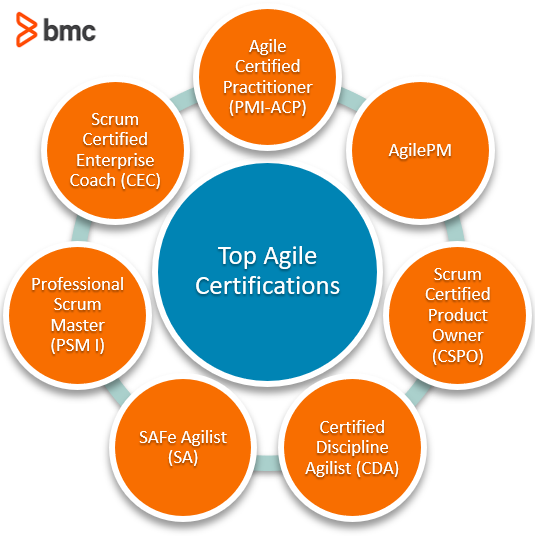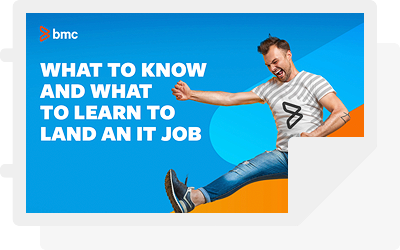There’s no doubt about it: Agile is a critical IT methodology that’s not going away anytime soon. In fact, research proves that Agile is the new norm, with a majority of enterprises primarily using it.
That’s why it’s no surprise that there is high demand for IT professionals who possess the knowledge needed to spearhead the Agile approach head-on. But what’s the best way to get acquainted with these principles if you are unfamiliar with it?
Fortunately, accessing Agile training is as simple as obtaining one of many Agile certifications, whether you are looking to expand your knowledge in the field of software development or you want to rise to the top in project management. So, we put together this list of some of the top Agile certifications of 2020, including:
- Who is best suited for each certification
- How to earn each certification
Popular Agile methodologies
When beginning your search on Agile certifications, it’s important to understand what Agile method you are looking to obtain training in—there are a number to choose from, including:
- Scrum
- Kanban
- Extreme Programming (XP)
- Lean Agile
- Scaled Agile Framework (SAFe)
- Agile Project Management (APM)
- Crystal
- Dynamic Systems Development (DSD)
All of these methods require strong teams and individuals who understand their specific roles and responsibilities within the Agile framework.
And now, onto our roundup of top Agile certifications.

PMI Agile Certified Practitioner (PMI-ACP)
Accrediting body: The Project Management Institute (PMI)
Cost: Members $435; Non-members $495
The PMI-ACP certification has proven its worth over the past few years and will continue to be in high demand in 2020 because it is a catch-all Agile certification that formally recognizes a developer’s Agile knowledge in a number of popular methodologies like Lean and Kanban.
Who should seek a PMI-ACP?
Certification is recommended for any professional who currently works on an Agile team or works for an organization that is seeking to increase Agility. Candidates must meet the prerequisites:
- Secondary degree
- 21 hours of training in Agile
- 2,000 hours of general experience on a project team
- 1,500 hours experience with agile methodology on a team
Other certifications from PMI include:
- Project Management Professional (PMP)®
- Program Management Professional (PgMP)
- Portfolio Management Professional (PfMP)®
- Certified Associate in Project Management (CAPM)®
- PMI Professional in Business Analysis (PMI-PBA)®
- PMI Agile Certified Practitioner (PMI-ACP)®
- PMI Risk Management Professional (PMI-RMP)®
- PMI Scheduling Professional (PMI-SP)®
APMG International Agile Project Management
Accrediting body: APM Group International
Cost: $290-$450
The APMG International Agile Project Management certification, also known as AgilePM, validates an employee’s ability to understand and embody Agile principles in project management. This leads to faster, more successful delivery of projects, better communication, lower cost and an adherence to Agile principles in the workplace.
APM Group International accredits organizations worldwide, in the following sectors:
- Aerospace
- Business
- Risk and Change Management
- Cybersecurity
- IT
- Project Management
Who should seek AgilePM certification?
The certification is offered at two levels:
- Ideal for practicing project managers with limited Agile knowledge or Agile teams looking to become project managers.
- Intended as the next step for those who have already achieved Foundation level certification.
Scrum Alliance Certified Product Owner (CSPO)
Accrediting body: Scrum Alliance
Cost: $1,300
The Product Owner (PO) is the visionary stakeholder on most Scrum teams. This, oftentimes, is the person who owns an idea and its delivery to an audience of the PO’s choosing. At the same time, the role is nuanced and can vary from organization to organization depending on context.
Regardless, a Certified Scrum Product Owner understands five key pillars of product ownership and can demonstrate knowledge of them. These include:
- Understanding the Role of the Product Owner
- Describing Purpose and Strategy
- Understanding Customers and Users
- Testing Product Assumptions
- Working with the Product Backlog
Who should become a CSPO?
Certification is best sought by professionals who have some familiarity with Scrum, but for those who do not, Scrum Alliance suggests a number of resources to work through in advance of applying for certification. Certification is earned after you complete a 16-hour class and it includes a two-year membership to Scrum Alliance, intended to help new CSPOs to get familiar with the Scrum community.
The agency offers a number of other certifications that include:
- Certified ScrumMaster® (CSM)
- Advanced Certified ScrumMaster®(A-CSM®)
- Certified Scrum Product Owner® (CSPO)
- Advanced Certified Scrum Product Owner® (A-CSPO®)
- Certified Scrum Developer® (CSD)
- Certified Scrum Professional® (CSP)
- Certified Team Coach (CTC)
- Certified Enterprise Coach (CEC)
- Certified Scrum Trainer® (CST)
- Certified Agile Leadership (CAL)
Scrum Alliance Certified Enterprise Coach (CEC)
Accrediting body: Scrum Alliance
Cost: $250 + $750 annually for licensing fees
Perhaps one of the more valuable certifications for enterprise organizations, the Scrum Alliance Certified Enterprise Coach has a demonstrated history working on Scrum teams as well as a deep foundational knowledge of the principles of Scrum and how they apply to enterprise organizations at all levels.
Who should earn a CEC?
This certification is ideal for business leaders who have an intimate understanding of the principles of Scrum and enterprise transformation. More specifically, they should be savvy in the following subject areas:
- Leadership and coaching
- Organizational transformation
- Agile methods for enterprise businesses
CECs are tasked with helping organizations become Agile using Scrum principles as a foundation. There’s a long list of prerequisites for those ambitious enough to take this next step in their career.
Scrum.org Professional Scrum Master (PSM I)
Accrediting body: Scrum.org
Cost: $150
The PSM I certification is highly sought after because it allows IT professionals to display a deep knowledge of Scrum principles within the role of the Scrum Master. It’s also recommended for those who are already in the role but who only possess the foundational concepts of being a Scrum Master.
A unique quality of Scrum.org is that their certifications only focus on Scrum methods. As a result of this specialized focus, the organization has fewer offerings than some of the other accrediting bodies we’ve discussed so far. These include:
- Professional Scrum Master (PSM)™
- Professional Scrum Product Owner (PSPO)™
- Professional Scrum Developer (D-I)™
- Scaled Professional Scrum (SPS)™
Who should seek a PSM I?
The PSM I is designed for anyone who can display basic knowledge of Scrum foundational principles and apply them to real-world scenarios. The PSM I does not require a course in advance of testing, though Scrum.org recommends one of the following courses to prepare:
- Professional Scrum Foundations Course
- Professional Scrum Master Course
After achieving PSM-I, Scrum professionals can continue to certify up to Level III by taking subsequent exams.
SAFe Agilist (SA)
Accrediting body: Scaled Agile
Cost: $1,000
A SAFe Agilist is also known as a Scaled Agilist. This is the title given to a person who has successfully attended and passed the course Leading SAFe. The two-day informational course and assessment develops and validates the following outcomes:
- Successful application of SAFe in Lean and Agile enterprise environments
- Recognition of Lean-Agile mindset
- Development and empowerment of employees by way of a Lean portfolio
- Support of Lean-Agile leadership principles that lends itself to organizational transformation
- Continuous release software of value in a regimented cycle of continuous improvement
As organizations struggled to apply the basic foundations of Agile to their organization, Scaled Agile diluted the principles of popular methodologies into one easy to apply framework called SAFe. Since then, they have been training and certifying individuals who want to optimize their organizations using the framework.
Who should become a SAFe Agilist?
Any software developer who wants to learn transformational skills that help them succeed in an environment of disruptive technology should take the Leading SAFe course and become an SA.
DAC Certified Disciplined Agilist (CDA)
Accrediting body: Disciplined Agile Consortium
Cost: $100
A CDA is a gateway software development certification that shows an individual possesses basic knowledge of Disciplined Agile principles and is ready to apply them and gain real-world experience.
Who should earn a CDA?
CDA is an entry-level certification sought by people who are new to the field of software development or who have some experience but want to take their career to the next level and stand out to employers.
Additional certifications include:
- Disciplined Agilist (DA) ®
- Certified Disciplined Agilist (CDA) ®
- Certified Disciplined Agile Practitioner (CDAP) ®
- Certified Disciplined Agile Coach (CDAC)®
Top Agile certifications
The future looks bright for Agile practitioners. There’s no time like the present to get started on your journey to Agile career success. With one of these critical Agile certifications you can take your career to the next level:
- PMI Agile Certified Practitioner (PMI-ACP)
- APMG International Agile Project Management (AgilePM)
- Scrum Alliance Certified Product Owner (CPO)
- Scrum Alliance Certified Enterprise Coach (CEC)
- org Professional Scrum Master (PSM)
- SAFe Scaled Agilist (SA)
- DAC Certified Disciplined Agilist (CDA)
Additional resources
For more on this topic, explore:






